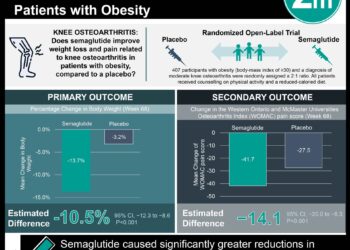Excess body fat is a major risk factor for premature death among Hispanic patients
1. Increases in body mass index (BMI) were associated with all-cause mortality among the Hispanic population included in this prospective study.
2. Abdominal adiposity was found to be a particularly strong major risk factor for premature death within this population, even after adjustment for BMI and hip circumference.
Evidence Rating Level: 2 (Good)
Study Rundown: Studies have shown that both cardiovascular and all-cause mortality is increased with elevated BMI. However, two recent analyses of small prospective studies in Hispanic adults did not find associations between all-cause mortality and obesity. Considering the discrepancies in these results, the authors of this prospective study examined whether body mass index (BMI) was associated with mortality in Hispanic populations. Specifically, they assessed the causal relevance of adiposity to mortality in Hispanic adults in the setting of 2 Mexico City districts. Excess body fat, especially around the waist, was found to be a major risk factor for premature death in the study population. Of note, BMI under 25 seemed to have an inverse correlation with mortality although deaths in this group were too few for robust statistical significance.
One limitation of this study was that there was lacking data on the incidence of nonfatal diabetes, renal and vascular disease. Further, the primary outcome measured was all-cause-mortality, however the cause of death was determined from death certificates. Further, since the inclusion criteria excluded those with chronic disease and diabetes during recruitment, the participants were on average healthier than what might be found in the general population. Despite these limitations, the results of this study indicate that general and abdominal adiposity are major risk factors for premature death among the Hispanic population.
Click to read the study in Annals of Internal Medicine
Relevant Reading: Hispanic health in the USA: a scoping review of the literature
In-Depth [prospective study]: This prospective study included adults aged 35 years or older who were residents of two Mexico City districts between 1998 and 2004. Participants were excluded if they had a previous diagnosis of diabetes or chronic medical conditions such as renal disease or cancer. Mortality was assessed up to January 1st 2016 by using the Mexican electronic death registry. A total of 115 400 adults aged 35 to < 75 years and 6697 aged 75 to < 90 years were ultimately included in this study and followed for up to 14 years. The primary measurements were BMI, waist-to-hip ratio, waist circumference and cause-specific mortality. The authors then conducted Cox regression analyses to assess mortality hazard ratios. BMI was found to be inversely related to mortality below 25 kg/m2. Further, with each 5-kg/m2 increase in BMI there was an associated mortality increase of 40% at ages 40 to < 60 years (HR, 1.40 [CI, 1.30 to 1.49]), 24% at ages 6o to < 75 years (HR, 1.24 [CI, 1.17 to 1.31](, and 21% at ages 75 to < 90 years (HR, 1.21 [CI, 1.15 to 1.28]) (P for effect modification across the 3 age ranges = 0.003). Waist circumference was highly related to mortality and remained strongly correlated after adjustment for BMI and hip circumference.
Image: PD
©2019 2 Minute Medicine, Inc. All rights reserved. No works may be reproduced without expressed written consent from 2 Minute Medicine, Inc. Inquire about licensing here. No article should be construed as medical advice and is not intended as such by the authors or by 2 Minute Medicine, Inc.






